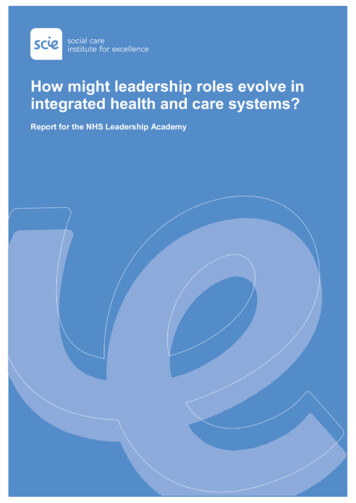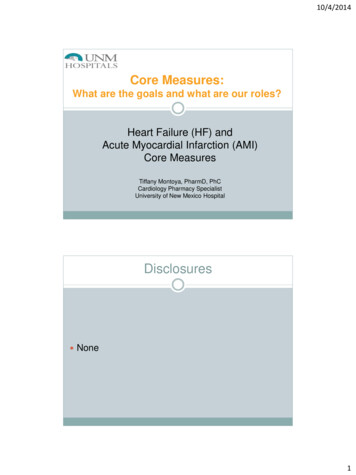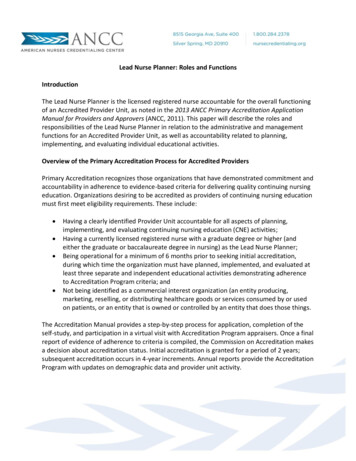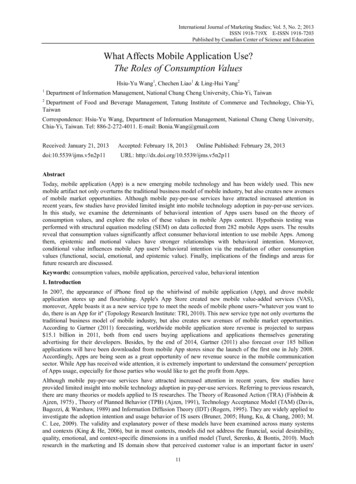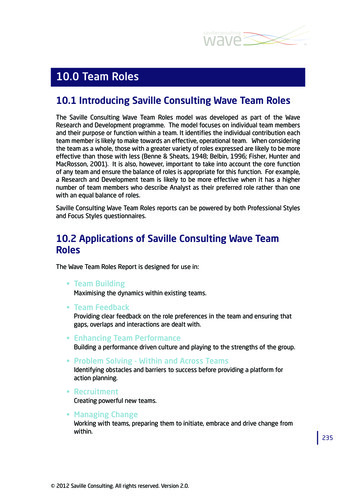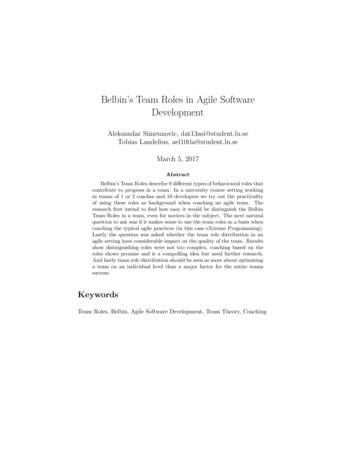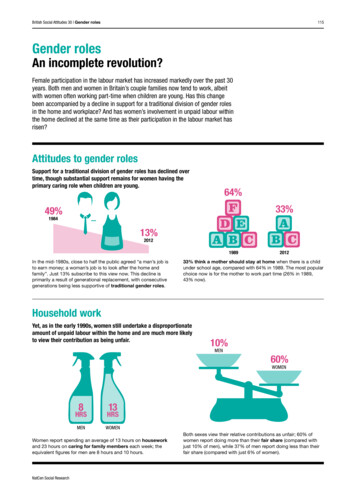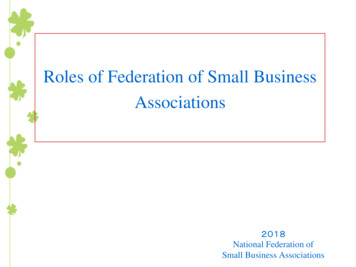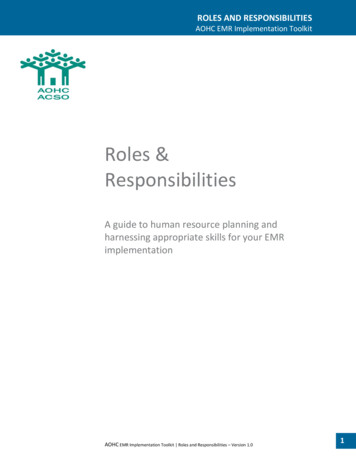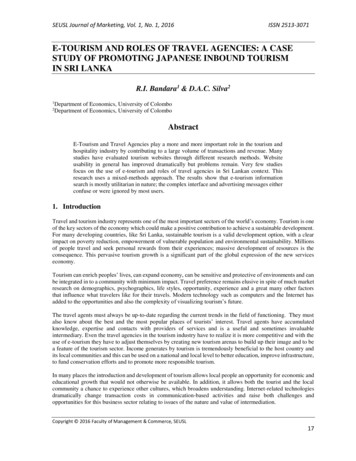
Transcription
SEUSL Journal of Marketing, Vol. 1, No. 1, 2016ISSN 2513-3071E-TOURISM AND ROLES OF TRAVEL AGENCIES: A CASESTUDY OF PROMOTING JAPANESE INBOUND TOURISMIN SRI LANKAR.I. Bandara1 & D.A.C. Silva212Department of Economics, University of ColomboDepartment of Economics, University of ColomboAbstractE-Tourism and Travel Agencies play a more and more important role in the tourism andhospitality industry by contributing to a large volume of transactions and revenue. Manystudies have evaluated tourism websites through different research methods. Websiteusability in general has improved dramatically but problems remain. Very few studiesfocus on the use of e-tourism and roles of travel agencies in Sri Lankan context. Thisresearch uses a mixed-methods approach. The results show that e-tourism informationsearch is mostly utilitarian in nature; the complex interface and advertising messages eitherconfuse or were ignored by most users.1. IntroductionTravel and tourism industry represents one of the most important sectors of the world’s economy. Tourism is oneof the key sectors of the economy which could make a positive contribution to achieve a sustainable development.For many developing countries, like Sri Lanka, sustainable tourism is a valid development option, with a clearimpact on poverty reduction, empowerment of vulnerable population and environmental sustainability. Millionsof people travel and seek personal rewards from their experiences; massive development of resources is theconsequence. This pervasive tourism growth is a significant part of the global expression of the new serviceseconomy.Tourism can enrich peoples’ lives, can expand economy, can be sensitive and protective of environments and canbe integrated in to a community with minimum impact. Travel preference remains elusive in spite of much marketresearch on demographics, psychographics, life styles, opportunity, experience and a great many other factorsthat influence what travelers like for their travels. Modern technology such as computers and the Internet hasadded to the opportunities and also the complexity of visualizing tourism’s future.The travel agents must always be up-to-date regarding the current trends in the field of functioning. They mustalso know about the best and the most popular places of tourists’ interest. Travel agents have accumulatedknowledge, expertise and contacts with providers of services and is a useful and sometimes invaluableintermediary. Even the travel agencies in the tourism industry have to realize it is more competitive and with theuse of e-tourism they have to adjust themselves by creating new tourism arenas to build up their image and to bea feature of the tourism sector. Income generates by tourism is tremendously beneficial to the host country andits local communities and this can be used on a national and local level to better education, improve infrastructure,to fund conservation efforts and to promote more responsible tourism.In many places the introduction and development of tourism allows local people an opportunity for economic andeducational growth that would not otherwise be available. In addition, it allows both the tourist and the localcommunity a chance to experience other cultures, which broadens understanding. Internet-related technologiesdramatically change transaction costs in communication-based activities and raise both challenges andopportunities for this business sector relating to issues of the nature and value of intermediation.Copyright 2016 Faculty of Management & Commerce, SEUSL17
SEUSL Journal of Marketing, Vol. 1, No. 1, 2016ISSN 2513-30712. Problems of the StudyIn today’s hi-tech world, people have access to all kinds of information. As online travel sites continue to grow,it is interesting to notice who books on travel web sites and who calls a travel agency. Both verticals provideunique opportunities. It is a human nature to contact a reliable travel agent before the traveler venture out in searchof peace and relaxation. Research question of this study is to examine to what extent the travel agency operationsaffect the Japanese inbound tourist promotion in Sri Lanka and what are the possible strategies that travel agenciescan generate with the use of e-tourism to improve Japanese inbound tourism in Sri Lanka as there is a less touristarrivals from Japan comparatively?3. Research Objective To examine the present roles of Sri Lankan travel agencies for when they promote specifically Japaneseinbound tourism in Sri Lanka.To analyze the impact of e-tourism on travel agency operations promoting Japanese inbound tourism inSri LankaTo examine the key challenges prevailing with the travel agency operations in using e-tourism topromote Japanese tourists to Sri Lanka.To indicate most suitable strategies to promote Japanese inbound tourism in Sri Lanka with the use ofe-tourism.4. Theoretical background and literature review of the studyTourism is traveling for predominantly recreational or leisure purpose or the provision of services to support thisleisure travel. The World Tourist Organization defines tourism as, "people who travel to and stay in places outsidetheir usual environment for not more than one consecutive year for leisure, business and other purposes not relatedto the exercise of an activity remunerated from within the place visited."Tourism is vital for many countries, due to the income generated by consumption of goods & services by tourists,the taxes levied on business in the tourism industry & the opportunity for employment in the service industriesassociated with tourism. Stynes & Cynthia (1987) stated that the tourism is one of many activities in a communityor region that requires planning and coordination.However, tourists cause environmental damages through forest fires, destruction of sand dunes and pollution.Consequently this serves negatively as increased pollution disturbs local residents and also it may discouragetourists from further entering the country. After this, tourism undermines culture by commercializing it and thisis often connected with increasing litter, graffiti, vandalism and noise- tourists do not always respect traditionalcultures.The impacts of tourism are that because of its nature, tourism may exert both positive and negative impacts onthe socio-cultural, natural and economic environment of Sri Lanka. Because the development of internationaltourism has been relatively modest and based on visitors with a similar culture, the socio-cultural impacts haveto date been limited. More significantly however, is the adverse impact of large volumes of domestic tourismupon the cultural and natural heritage sites all of which are suffering various forms of degradation.Tourism has been identified as capable of effectively driving country’s socio – economic development. The visionfor the tourism sector is to make Sri Lanka the foremost leisure destination in the South Asia Region. It believesthe human resources and natural and cultural endowments value and ethos will be fundamental in transformingSri Lanka in to a Centre of excellence and offer tourists the highest values of authentic experiences in its uniquesetting.Tourism in Sri Lanka is forecast to be the 4th highest revenue earner by 2010. Given the high returns estimateand its importance to the country’s economic growth, a focused plan to develop this lucrative market has beenCopyright 2016 Faculty of Management & Commerce, SEUSL18
SEUSL Journal of Marketing, Vol. 1, No. 1, 2016ISSN 2513-3071implemented by the Sri Lanka Tourism Promotion Bureau (SLTPB).The SLTPB will pursue a major publicrelations drive that will strive to promote and build the country’s image. With the added expertise of a localadvertising agency, the SLTPB is committed to building Sri Lanka’s brand image and market reach.Tourist arrivals to Sri Lanka reached a new high in 2010 registering a growth of 46.15% to 654,477 arrivals fromthe previous year’s figures of 447,890. In absolute terms, this amounted to an increase of 206,587 tourist arrivalsto Sri Lanka during one single year, which is again unprecedented in the history of tourism in Sri Lanka. Japanesetourist arrivals to Sri Lanka in 2009 have a slight growth from 10,578 in 2008 to 10,931.The Sri Lanka Tourism Development Authority (SLTDA) is committed to develop the current and potential newmarkets. Together with the Sri Lankan Government and the local and international media partners, the SLTDAoffers investors various attractive and feasible trade support schemes and business opportunities.According to the newly launched Tourism Development Strategy, the main target of the tourism sector in the nextfive years is to achieve a target number of 2.5 million tourists by 2016 being in line with the January 2010. Theexpectations set for the development of tourism industry in the said time period covering all aspects ofinfrastructure development, standardization of products and services, improving the brand awareness and finallygearing all efforts towards achieving sustainability in the long run as booming sector directly contributing a largeshare to Sri Lanka’s Economic Development.The initiatives and policies of the newly launched publication will act as a benchmark for tourism sector for thenext five years to come with the stretched goal of preparing the industry to move forward to achieve targetsspecified up to year 2020.With a tag line “Refreshingly Sri Lanka: The Wonder of Asia” and as world’s most treasured island the specificstrategies related to the five year plan are, creating an environment conducive for tourism; attracting the right typeof tourists; ensuring that departing tourists are happy; improving domestic tourism and contributing towardsimproving the global image of Sri Lanka. The unique selling propositions of destination Sri Lanka areauthenticity, compactness and diversity.As competition within the tourism environment is growing globally, the SLTPB is committed to see more foreigntourists visiting Sri Lanka and also develop new initiatives that would keep the domestic market on an upwardtrend. The SLTPB’s goal is to see its innovative and ambitious strategy materialize, even as potential travelersvisit Sri Lanka, thus converting a global fondness for the country into actual visitation and increased spendingand dispersal.It is evident that e-business is an essential prerequisites for successful organizations in the emerging, globallynetworked, internet empowered business environment, especially for tourism industry. Many tourism-relatedorganizations had to go through a major processes re-engineering to take advantage of the emerging technologiesin order to transform their processes and data handling as well as their ability to operate and to compete inemerging global market place (Loudan.K, 2007).E-tourism determines the competitiveness of the organization by taking advantage of intranets for reorganizinginternal processes, extranets for developing transactions with trusted partners and the Internet for interacting withall its stakeholders and customers. The e-tourism concept includes all business functions (i.e., e-commerce, emarketing, e-finance and e-accounting, e- human resource management, e-procurement, e- research anddevelopment, e-production) as well as e-strategy, e-planning and e-management for all sectors of the tourismindustry, including tourism, travel, transport, leisure, hospitality, principals, intermediaries and public sectororganizations. Hence, e-tourism bundles together three distinctive disciplines: business management, informationsystems and management, and tourism (Buhalis & O'Connor, 2005).Travel agents come as a blessing to use in such times as these, as they handle all the travel arrangements – rightfrom booking the airfare to reserving hotel rooms (Bantwal, 2009). Travel agents are professionals that can helpthe traveler arrange for all their traveling needs. Despite the massive use of the internet for travel related servicesthere are still instances when hiring travel agents are necessary. For years ago, when the internet has not yetreached its present state and condition, people who have plans on traveling hired travel agencies or travel agentsto help them prepare for their planned tour (Eleazar, 2010). A travel agency sells travel arrangements directly toCopyright 2016 Faculty of Management & Commerce, SEUSL19
SEUSL Journal of Marketing, Vol. 1, No. 1, 2016ISSN 2513-3071the public. More specifically, an agency sells air, land and sea transportation, accommodation, cruise trips,package tours, travel insurance and other related products (Foster, 1990).Most people who go on vacation like to book trips through a travel agent in order to take some of the stress outof the planning process. Travel agents can also help travelers to save money on flight, hotel rooms, cruises, andmore (Bradley, 2009). Travel agents are the persons who organize and plan the trips for their clients. They arevery helpful to the travelers. A lot of tours and travels companies are offering lucrative packages to the travelersthese days. Travel agents are the persons who arrange all kinds of transportation and accommodation facilitiesfor tourists. The sale and purchase of travel and other related services are arranged by a tours and travels agency(Max, 2010).Travel agent is pivotal in making traveler’s vacation the most hassle-free and pleasurable one. For deciding whichtravel package is the best for the traveler to planning the entire holiday, travel agents will do all the necessaryhome work on behalf of the traveler and will find out what are best deals available. Because they are soknowledgeable, their importance can never be ignored or ridiculed (Bantwal, 2009). Travel agents have quickeraccess to the deals many travel sites offer and can save time researching if traveler provides a few basics liketravel preferences and departure cities (School, 2010).Good travel agents have an
In today’s hi-tech world, people have access to all kinds of information. As online travel sites continue to grow, it is interesting to notice who books on travel web sites and who calls a travel agency. Both verticals provide unique opportunities. It is a human nature to contact a reliable travel agent before the traveler venture out in search

